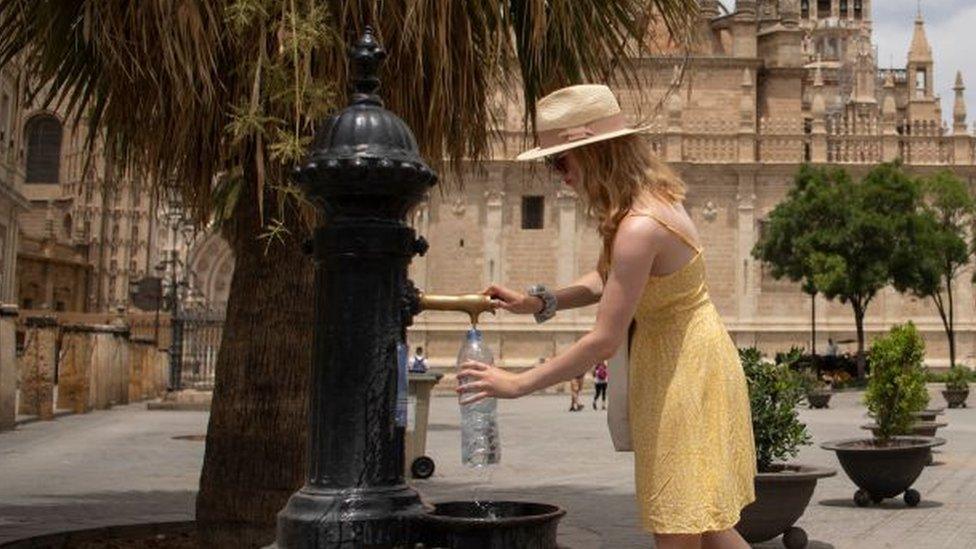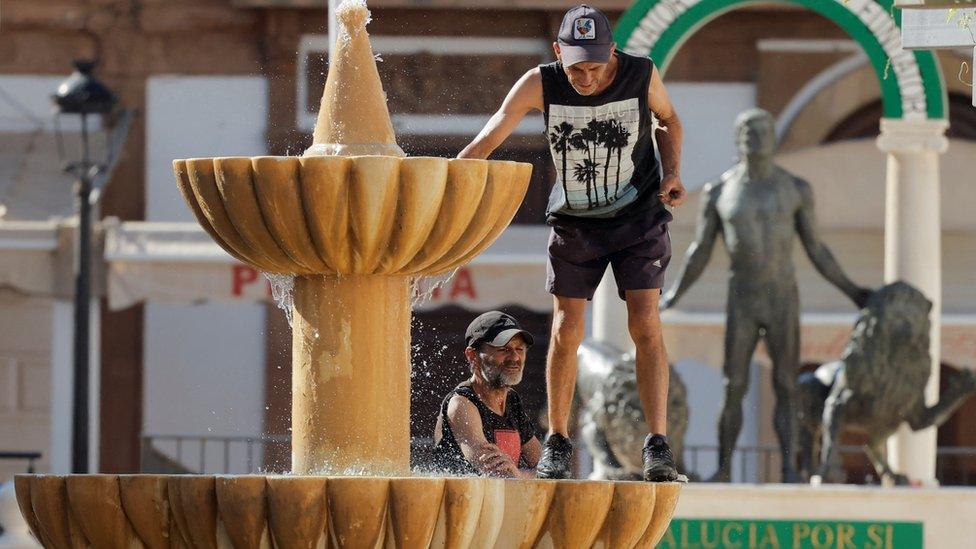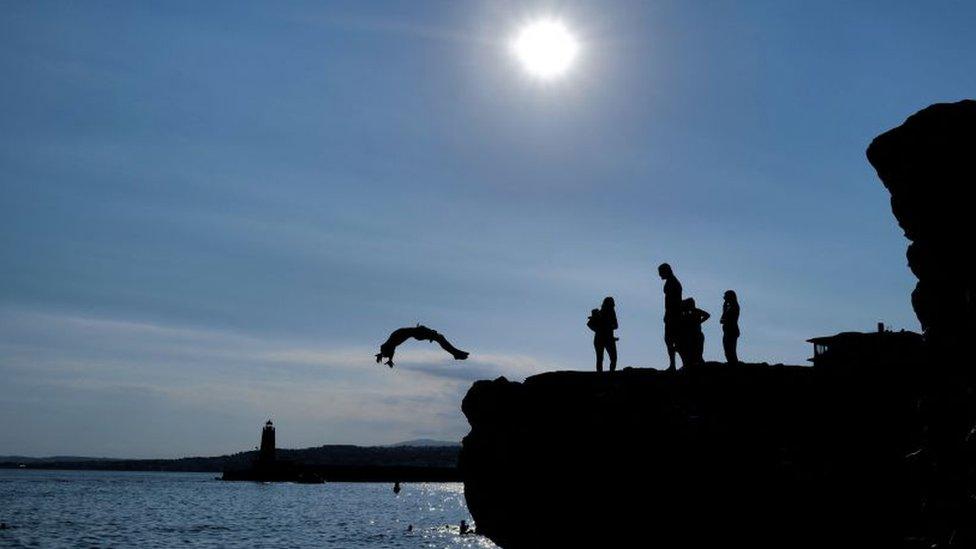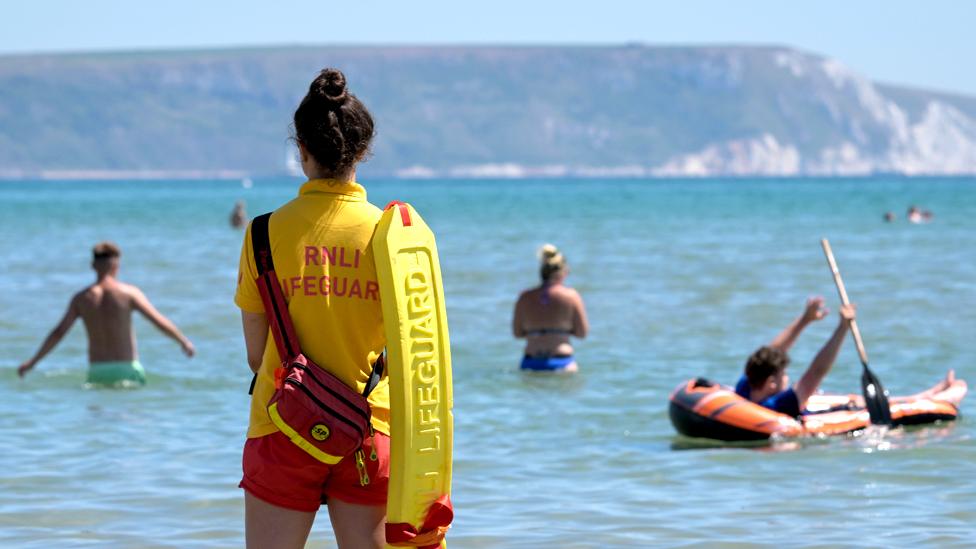Europe swelters as heatwave spreads
- Published

Soaring temperatures have gripped parts of Europe, which has barely recovered from its last heatwave.
Droughts and forest fires have hit Spain and Portugal and the scorching heat has spread to France and the UK.
Temperatures are set to peak on Thursday in France and Spain and authorities have cancelled traditional fireworks displays on France's national day to reduce the risk of fires.
Heatwaves have become more frequent, more intense, and longer-lasting because of climate change. The world has already warmed by about 1.1C since the industrial era began.
This is the picture as seen by our BBC colleagues sweltering on the continent.

Extreme heat in northern Spain
By Guy Hedgecoe, Madrid
The heat sweeping across Spain is unusual in that it is affecting almost the whole of the country.
High temperatures are often registered in the summer months, particularly in southern and central areas of the country.
That is certainly the case during this heatwave, with Andalusia, Castilla La Mancha and Extremadura all seeing temperatures in the low 40s Celsius so far this week. However, northern Spain, which usually avoids extreme temperatures, is also being hit, with the north-western region of Galicia on red alert - the highest category - as it braces itself for temperatures of up to 42C in the Miño valley.

Andalusia is one Spanish province that is feeling the heat
Another 13 regions are on orange or yellow alert.
The north-eastern city of Zaragoza is forecast to see temperatures of up to 43C, while Badajoz, in the south-west, is set to hover around 45C.
Air quality is poor in many areas across the north because of the heat. That adds to existing health concerns caused by the hot weather, which mean that the streets of towns and villages tend to be much quieter in the afternoon.
With the heatwave expected to continue into the weekend, it could break records in terms of length if it goes on into next week.

Soaring temperatures across Portugal
By Alison Roberts, Lisbon
An unprecedented 80% of mainland Portugal is at "exceptional" risk of fires, according to national meteorological institute IPMA.
The government has put the whole of the mainland under a "state of contingency" until Friday - one notch above "state of alert" and the second-highest of three levels.
That triggers local, regional and national responses, putting police and other forces at the ready, and releasing funds to hire more firefighters.
Watch: Wildfires break out across parts of Portugal
On Tuesday there were 849 firefighters in action at the scene of 30 fires, only three of which were deemed not under control. That is down from well over 2,000 the day before.
Several major fires burning over the weekend have now been extinguished or brought under control, though not before consuming thousands of hectares of forest.
The IPMA had forecast maximum temperatures as high as 47C in the coming days, however that has now been revised to 45C.
While there may be some thunderstorms, meteorologists warn that any rain may evaporate before reaching the ground.
Tourism is already being affected, even in areas as yet untouched by fires.
In the popular tourist destination of Sintra, near Lisbon, the national palaces, castle and other attractions are closed by government order.
There are also fears that a big music festival scheduled to take place from Thursday to Saturday near the beach at Meco, in Sesimbra, south of Lisbon, and a motorbike rally in the Algarve which is one of Europe's largest will have to be cancelled.

Heatwave hits Bastille Day
By Georgia Goble, Paris
Temperatures in France are set to reach 39C in some areas of the south-west in a heatwave that will last between eight and 10 days, according to Météo France.
While rising temperatures are not predicted to break records as in other European countries, there are concerns about the possible consequences.

Some people in Nice are jumping into the sea to cool off
With 23 departments placed under a yellow warning, and with orange alerts potentially coming into place from Wednesday, Prime Minister Elisabeth Borne has urged ministers to take action to minimise health risks, especially for vulnerable groups.
A health plan has also been rolled out by the government in all areas on alert. Meanwhile, Thursday's 14 July Bastille Day will be somewhat less colourful, with fire risks leading to the cancellation of firework displays in some areas of the country.
Although it is too early to make comparisons with the 2003 heatwave in which an estimated 15,000 people died, France is nonetheless in a state of caution.
Susan Powell looks at the sustained heatwave across Europe
- Published12 July 2022

- Published11 July 2022
